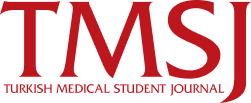ABSTRACT
Aims:
Hypermobility is a condition which increases the joint mobility range. Beighton method is used in diagnosis of hypermobility. Schober test and chest expansion measurement are frequently used to evaluate mobility of spine and expansion ability of chest in ankylosing spondylitis volunteers. In this study, it is aimed to investigate the impact of hypermobility on Schober test and chest expansion.
Methods:
The data of 300 healthy volunteers aged between 18 and 32 was collected. Beighton score, chest expansion and Schober score of all volunteers were measured and statistically analyzed using SPSS. Student’s t-test was performed to compare both groups. As for descriptive statistics, mean ± standard deviation and numbers were used.
Results:
One hundred twenty-two cases having Beighton score of 4 and above included in hypermobility group while 178 cases under 4 served as control group without hypermobility. No significant relation in terms of chest expansion and Schober score was found out between groups. There was a slight positive correlation between Beighton score and Schober score in whole group. In male population, both test scores had a correlation with Beighton score while only chest expansion had correlation in female population.
Conclusion:
Although Beighton score seemed to have no effect on Schober or chest expansion scores in between group comparisons, correlation analysis revealed that hypermobility may affect the scores, especially in males.



